![]()
The Words The Kwak Family
|
|
The Words The Kwak Family |
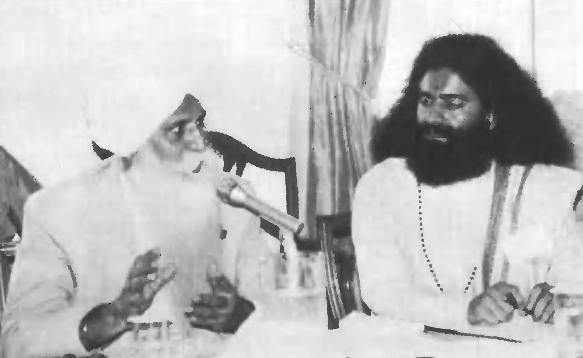
A
Sikh leader and a Hindu swami exchange ideas
Following Father's guidance that religious leaders must be the internal leaders for bringing about lasting peace, the Council for the World's Religions (CWR) recently joined with leaders from both the Hindu and the Sikh communities to organize what proved to be a conference of historical significance. The Hindu-Sikh Dialogue, held from July 17 -- 21, 1988, in Srinagar, Kashmir, India, was the first conference in modern times, and perhaps ever, to bring Hindus and Sikhs together to examine the theological and social issues confronting these two intimately related families of faith.
The CWR is gaining a reputation as the leading organization bringing religious leaders from the world's most troubled areas together to begin a dialogue for peace. In areas of high conflict, people often presume religion and religious fervor to be the cause of unrest. The CWR believes, however, that it is only when the sacred ideals of the founders of religions are abandoned or perverted that the fundamental goodness and tolerance inherent in all of the world's great religions is cast aside and replaced with the dark side of human character, which leads to conflict and war.
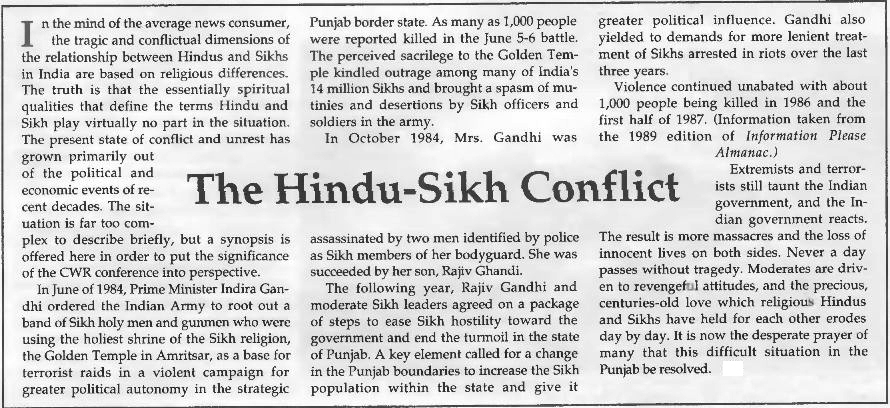
During this conference, Hindus and Sikhs worked, laughed, and wept together, longing to reestablish the conditions in which, as brothers and sisters in faith, they could share peacefully in the daily life of India once again.
Those whose knowledge of Hindu- Sikh relations has grown only in light of the media coverage of the recent tragic conflicts between Hindus and Sikhs may think that the enmity between these two faith communities is deep-seated. But this is not the case. What one discovers when theologians, historians, and religious and civil leaders gather to seek peace is that the Hindus and Sikhs have enjoyed centuries of mutual respect, cooperation, and even intermarriage. To be sure, there have always been fundamental theological differences between the two communities. These were discussed openly and vigorously throughout the conference -- but without any hostility.
To date, violence and terrorist attacks have plagued many of the peace-seeking efforts involving these two groups. Again and again, headlines have spoken of lives lost while people have gathered to discuss peaceful solutions or to pray for peace. Even secret sum it's have been the objects of murderous attacks. Who would take the risk of having his name associated with a conference of this nature, or of traveling to attend a face-to- face meeting with one's alleged enemies? The danger of holding this dialogue lay not from within the carefully invited group, but in the unpredictability of the radical elements that have been involved in the conflict between Hindus and Sikhs. Thus it can be said, not only of the participants but even more so of the convenors, that by their attendance they literally risked their lives to promote peace through religious dialogue and harmony. This level of commitment underlay all that transpired at the conference, and thus there was never a wasted moment. There was a deep seriousness and mutual respect already present even before the first words of welcome were spoken.
Dr. Avtar Singh, dean of the Department of Philosophy at Patiala University in the Punjab, convened representing the Sikhs, and Dr. K. L. Seshagiri Rao, professor of religion at the University of Virginia in Charlottesville, co-convened representing the Hindus. The reputations of these men, coupled with their persistence throughout the invitation process, resulted in the superior group of people who responded to our invitation to the conference. Widely read scholars and journalists, members of legislative bodies, university chancellors, and religious leaders representing literally millions of devout people attended this conference. Difficult issues were addressed head on, but the desire of every attendee for education and greater mutual understanding was prevalent in all the proceedings. Preeminent Hindus and Sikhs engaged one another in intensive discussions for three days. Some of the issues requiring serious debate between them were: the matter of caste; the concept of spiritual guides, or gurus; and celibacy as a spiritual ideal.
The effect of the conference on the participants themselves was profound because of the deep feelings underlying their motivation for attending the gathering. One participant wrote:
It was an excellent work.... The participants reacted with remarkable resilience, receptivity, and desire to know and learn from one another. Rev. Kwak's speech almost transformed me. I will always cherish his profound words, which moved me deeply. From here on, I shall carry the message of love and tolerance, understanding and accommodation, help and cooperation.
Another participant recently wrote the CWR office, saying:
The earnestness with which the organizers and participants took their work is bound to produce fruitful results. All the participants were keen to know each other's viewpoint in order to help remove differences at social and theological levels. I know you face many difficulties in achieving the desired objectives, but what is most important is that you have taken the initiative which in due course will certainly produce good results.
The day after the conference, Sikh and Hindu leaders, who had been moved by its depth, organized of their own accord both a luncheon and a dinner banquet in Delhi to honor the achievements of the CWR and to introduce its goals to business, political, and religious leaders. Over 100 such leaders attended these events.
It becomes ever clearer that the spiritual conditions established by Father for the unification of religions, combined with our faith and unity with these conditions, is creating the hope for enduring peaceful relations within the religious world.
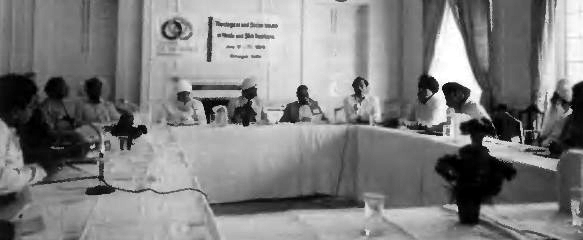
Theological
differences between Hindus and Sikhs were discussed openly and
vigorously throughout the conference -- but without any hostility
This speech, in Rev. Kwak's absence, was delivered by Frank Kaufmann.
Esteemed guests, venerable spiritual leaders, honored scholars, pioneers in the path of interfaith harmony, ladies and gentlemen: I am delighted to welcome you to this important conference on Hindu/Sikh dialogue, sponsored by the Council for the World's Religions.
We are all here because we share the ideal of inter-religious harmony and cooperation. Each one of you has taken time away from busy schedules and important responsibilities to be here. In doing so, you already express your clear grasp of the urgency of the task which lies before us. I need not repeat what the headlines tell us every day. Suffice it to say that there is perhaps no greater offering we could make to God than to establish lasting harmony among the religions and religious believers represented here. Conflict between Hindus and Sikhs hurts the cause of all religions. How we long to say to God with one joyous voice: "Look at us. We who love You with all our hearts also love each other!" And then with the same voice say to the skeptic, the atheist, the materialist, as well as to the seeker, "Look at us. Religion and religious belief are not the source of our present problems; they are the cure. Belief in God does not lead to conflict. It is the foundation for lasting peace." This should be the reputation of religions and its leaders, but we are so far from this ideal.
Many would ask: "What good is having another conference? Everyone in the world is aware of the tragic conflict in the Punjab. What has been the result of meetings among leaders? Could a small and quiet gathering like this make a difference?" My answer is yes. Not a timid or qualified yes, but a bold and unequivocal one. The abundance of meetings among ambassadors, political scientists, and heads of state do not make this meeting irrelevant, but all the more relevant.
The breakdown in human relations becomes more deep-seated, more complex, and more widespread every day. Is this because the problems are incurable? Or because holding meetings is a misguided approach to curing problems? No. These are not the reasons. The persistence and expansion of conflict in India stems from the fact that the potential solution to the problems here has been eliminated from the conversation. Approaching religious conflict in India from purely -- or even primarily -- economic, political, or social perspectives is like trying to build peace in thin air. These approaches will always be helpful and necessary, but they will never be sufficient.
There is only one possible ground from which real peace can blossom.
Religious and ideological harmony is at the core of world peace because religions and ideologies guide a person's internal dimension.
The mind and heart with their internal values are subject over the body. The power to move people's minds to overcome anger and resentment, to forgive and be tolerant of each other's faults, and to strive for impartiality and compassion toward all has come through religion. When a person finds God in the core of the self, all hatred and prejudice perish. This is what makes your presence here, and all you will encounter and undertake in the next three days, so important. Religious leaders are the true internal leaders of the world. They hold the real key to peace.
With this power to guide a person's internal attitudes of mind and heart, religious leaders cannot afford to relinquish their precious authority to politicians, who so often inflame religious prejudice for selfish ends. We cannot afford to advocate or participate in divisive works and thereby disgrace our God. The Punjab, for example, has become a symbol to the world of the failure of religions to unite. Rather, it should be a beacon to the world of unity transcending the barriers of belief and other potentially divisive factors. It is the religious leaders who must pioneer the path toward harmony and cooperation. Sectarianism, racism, cultural elitism, and nationalism must first be transcended by those whose actions are seen by all to represent a loving God. Ultimately the political leaders, and leaders in all spheres of human endeavor, must be guided by the words and example of religious leaders. Peace cannot be dictated by external conditions. It must spring from the internal attitude of people's minds.
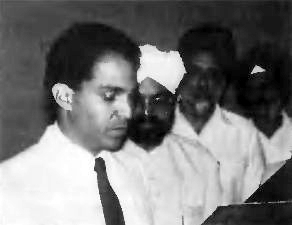
The
day after the conference, Sikh leaders honor Dr. Frank Kaufmann and
the work of the CWR
How can religion have the subjective power to bring peace to the world? In his keynote address at the 1985 Assembly of the World's Religions, Rev. Moon called for a new movement to revitalize and strengthen the spirit of each religion. This will not be a movement from the outside, preaching to each religion. Rather, I am convinced that each religion has within itself the resources to recover its original vitality and spirit. I believe that even now God is moving within each religion, stimulating men and women with sensitive souls and pure hearts to reawaken their faith.
This revitalization is born of relating the founder's standard to a visionary grasp of the present. The founders of each of the world's great religions were men inspired and led by God. They had intense faith and zeal to uncover the truth, and they endured trials and spiritual struggles along the way. They sought to relieve the suffering of humanity, disregarding their own lives. Therefore, God trusted them and revealed to them His deepest heart. Each religion should recover the pure spirit of its founder, the spirit of single-hearted devotion to God and service to humanity.
The religious founders were humble people who served their fellows with love. They foreswore luxury and privilege; they did not keep themselves isolated from the common people. Each saw in the meanest person a soul in need of salvation. They endured prison and exile. The founder's standard of true religion is the practice of God's love in the most miserable situation. When even committed Marxists will go out and share with the poor and common people, how can religious people remain contented and secure? Today's religions need leaders who will practice this standard of humble service
In addition to these standards, all the great religious founders had in common a spirit of tolerance and inclusiveness. Though living in societies rife with social and religious prejudice, they welcomed people from all classes, castes, tribes, religions, and nationalities to their new way. They taught a common standard of value, based not on the accidental criteria of birth or wealth, but on faith and purity of heart. If the founding spirit of religion is recovered, this broadminded spirit of accepting all people of good will will also flourish.
Today's situation needs leaders who are grounded in these rich and beautiful traditions, whose lives reflect their founder's standards, but who also have the vision to comprehend the entire world as one. While each religion originated in a restricted cultural environment, the modem environment for all cultures and religions extends to the entire globe. What do you think the founder of your religion would be teaching if he were born into this century? Would he not be dealing with the situations of modern man? The sufferings that afflict humanity today have their own distinct form. Their solutions call for specific programs and policies. Your gathering here in pursuit of this great goal of religious harmony in India is one expression of what is needed for this age. Would your religion's founder deny or affirm our gathering?
Thus inter-religious cooperation is not foreign to any of the great religions represented here; it is there at the very root! The religions of the world need leaders who have recovered their religion's founder's spirit, and then they will be able to take charge of the world's future. This revitalization will connect the past with the future, recovering the best resources of tradition for creative application for the needs of today. When this is achieved, the religions will be capable of fulfilling God's providential purpose in this age.
I pray that you will be able to go forth from this conference with courage. I pray that the insights and determinations that arise in the next days will be carried out by you with perseverance in your own spheres of influence. Please make deep bonds with one another so that you may all support each other in your future efforts to achieve these great ideals of peace and religious freedom.
May God bless you. Thank you very much.
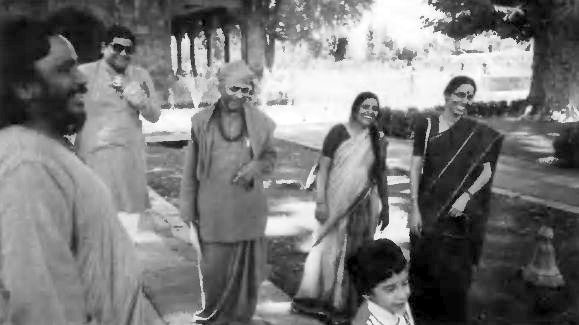
"Sectarianism,
racism, cultural elitism, and nationalism must first be transcended
by those whose actions are seen by all to represent a loving God."
Recently a rabbi contacted Frank Kaufmann, the executive director of the CWR, to ask for the ideological reasons why Rev. Moon expends the resources of his own movement on conferences for other world religions. The following is Dr. Kaufmann's response.
Dear Rabbi
Regarding your request for the ideological underpinnings of the work with which I am involved: The Council for the World's Religions has no agenda other than those goals and aims listed in its brochure. I believe these to be consistent with the founders' vision for the organization.
Why would Rev. Moon found and maintain an interfaith organization like the CWR at such great expense? I believe that Rev. Moon believes himself called by God to be an instrument for establishing cooperative and harmonious relations between people of faith and good will. His personal belief system is theistic in the tradition of the major covenant faiths, and thus he believes in the existence of a perfectly loving God as well as that of anti-theistic forces that seek to influence human nature, philosophical systems, and social and political institutions. Rev. Moon believes that the love of God, namely sacrificial love, is the only means by which to overcome the anti-God / anti-human forces. He believes that give and take action is the foundation for unity; thus, dialogue characterizes his peace-making efforts. He believes that the great, living, religious traditions reflect God's historical efforts to establish peace on earth and to perfect a loving relationship with His children -- past, present, and future. Therefore, Rev. Moon supports activities designed to bring strength and unity to all the world's living religious traditions, and he inspires them to maintain loving and cooperative relations with one another. His personal theology is contained in a large corpus of literature, but the primary work for the believing community known as the Unification Church is The Divine Principle, Level IV.
I hope this will be helpful, Yours sincerely,
Frank Kaufmann
Executive Director, CWR